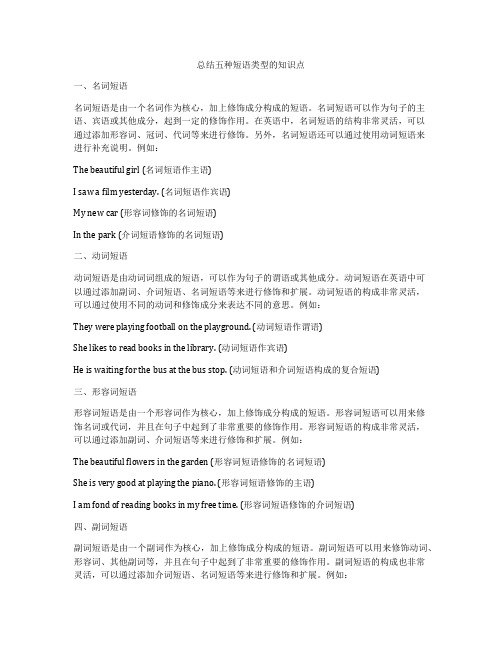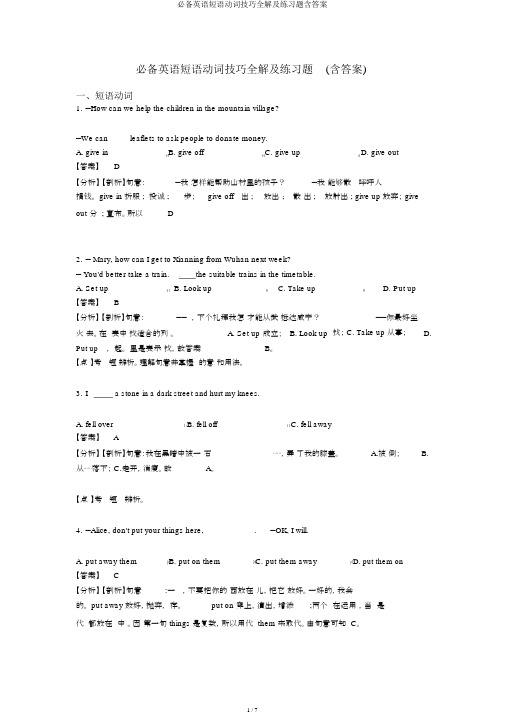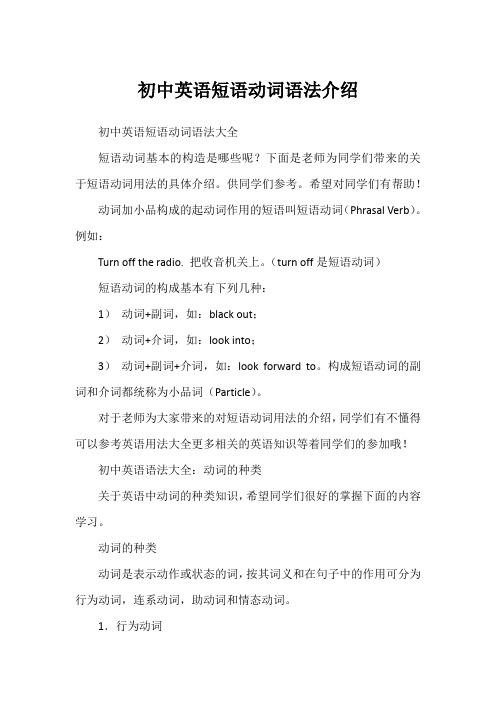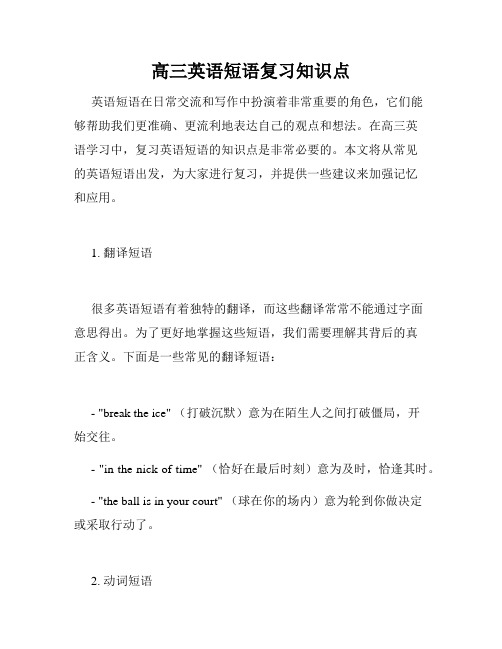英语课堂之短语精解
总结五种短语类型的知识点

总结五种短语类型的知识点一、名词短语名词短语是由一个名词作为核心,加上修饰成分构成的短语。
名词短语可以作为句子的主语、宾语或其他成分,起到一定的修饰作用。
在英语中,名词短语的结构非常灵活,可以通过添加形容词、冠词、代词等来进行修饰。
另外,名词短语还可以通过使用动词短语来进行补充说明。
例如:The beautiful girl (名词短语作主语)I saw a film yesterday. (名词短语作宾语)My new car (形容词修饰的名词短语)In the park (介词短语修饰的名词短语)二、动词短语动词短语是由动词词组成的短语,可以作为句子的谓语或其他成分。
动词短语在英语中可以通过添加副词、介词短语、名词短语等来进行修饰和扩展。
动词短语的构成非常灵活,可以通过使用不同的动词和修饰成分来表达不同的意思。
例如:They were playing football on the playground. (动词短语作谓语)She likes to read books in the library. (动词短语作宾语)He is waiting for the bus at the bus stop. (动词短语和介词短语构成的复合短语)三、形容词短语形容词短语是由一个形容词作为核心,加上修饰成分构成的短语。
形容词短语可以用来修饰名词或代词,并且在句子中起到了非常重要的修饰作用。
形容词短语的构成非常灵活,可以通过添加副词、介词短语等来进行修饰和扩展。
例如:The beautiful flowers in the garden (形容词短语修饰的名词短语)She is very good at playing the piano. (形容词短语修饰的主语)I am fond of reading books in my free time. (形容词短语修饰的介词短语)四、副词短语副词短语是由一个副词作为核心,加上修饰成分构成的短语。
英语常用短语精解之四

to take partat allto look upto wait on (upon)at leastso far1.to take part : (participate)【说明:】to take part(参加,参与)指参加宴会,会议,聚会等⽽⾔,后⾯⼀定要⽤in。
如果⽤with,则作袒护⽀持解,如He took part with me. (他加⼊我这⼀边⽀持我。
)【例:】(1) Henry was sick and could not take part in the meeting last night.亨利病了,昨晚他不能够参加会议。
(2)I did not want to take part in their argument.我不要参加他们的辩论。
2.at all : (in any degree, in the least-generally used only in a negative sense)【说明:】at all(丝毫,极少)为副词⽚语,多⽤于否定句以加强语⽓。
也可以⽤在疑问句中作究竟解,如Do you know at all?(你究竟知不知道?)⽤在if的后⾯作既然解,如If you do it at all, do it well. (既做,就好好地做。
)【例:】(1) He said that he did not have any money at all.他说他⼀点钱都没有。
(2)When I asked her whether she was tired, she said, “ Not all at!”当我问她是否疲倦时,她说,“⼀点也不!”3.to look up : (to search for-especially in a dictionary or catalogue where one must turn over pages)【说明:】to look up(查出,查找)尤指从字典或⽬录中翻查所要找的单字或号码条⽂等。
英语动词短语辨析的教案及解析含解析

英语动词短语辨析的教案及解析含解析一、选择题1.—If the customer rings up for me again, please ________ the call to the sales department.—OK, I will.A.run through B.look through C.go through D.put through 2.—Bilibili is popular among teenagers.—A survey about why teenagers like bilibili so much was ________ here last week. A.taken out B.carried out C.turned out D.worked out 3.—Excuse me, does Mr. Smith’s son live here?— He ________ be here. But now he ________ in the city.A.used to; is used to live B.was used to; is used to livingC.used to; is used to living D.is used to; used to live4.—Who’s going to ________ the children while you are away?—Don’t worry. My mum will come.A.look at B.look around C.look after D.look like 5.The director of Up series passed away, and the workmates are thinking about whether the documentary can ________ without him.A.carry on B.carry out C.take on D.take out 6.—What happened, Martin?—Last night, someone ________ my house and stole many valuable things.A.broke into B.broke down C.turned into D.turned down 7.— Hi, Simon! You look so excited. What happened?—We won the football match, and the result ________ to be better than expected. A.turned out B.found out C.worked out D.came out 8.—Sorry to ________ your valuable time.—It’s OK.A.take off B.take up C.take out D.take in 9.When you are given a difficult task, try to ________ it and finish it.A.join in B.stick with C.search for D.think of 10.Daniel is the most modest boy in our class, because he never ________ in public. A.gets off B.takes off C.shows off D.turns off 11.Judy waited a long time for her mom, but she didn't ________.A.show up B.get up C.wake up D.stay up 12.—We must act now as time is _________.—Yes. Let's start.A.coming out B.going out C.putting out D.running out 13.Last week a fireman came to our school and told us what to do if a fire ________. A.breaks out B.works out C.puts out D.runs out 14.—Dad,would you please____a brighter light in my bedroom?—Certainly.A.put in B.hand out C.hand in D.put out 15.—Hello, this is Taicang Middle School.—I want to talk to Mr. Chen. Can you ________ me ________?A.put…in B.put…out C.put…through D.put…up16.My father always tells me to ________ any possible challenge myself instead of giving up easily!A.take away B.take off C.take up D.take on 17.—How terrible the disaster is! Many people lose their homes and most of them are badly hurt.—I’m sure things are going to ________ fine because the soldiers, the most lovely people, are trying to help them.A.find out B.turn out C.run out D.put out18.The rain has stopped. Why not ________ the raincoat?A.take away B.pass away C.put away D.put off19.Most boys ________ toy guns while girls ________ have dolls.A.would rather; prefer B.prefer; would ratherC.would rather; would rather D.prefer; prefer20.The book is written by T. C.Smith.What does the “T. C.”?A.pay attention to B.regard as C.stand for D.set off 21.Volunteers ________ leaflets to encourage more people to separate rubbish correctly. A.put out B.find out C.hand out D.turn out 22.Please _____ the water when you brush your teeth.A.take down B.turn up C.take away D.turn off 23.—Aunt Lexie, could you please teach me how to _________ "red envelope" on WeChat?—Certainly. It goes like this.A.give away B.give up C.give back D.give out 24.—How was your May Day holiday?—Just so-so. We drove to Suzhou and tried to find a place for parking, but they were all________. A.turned up B.stayed up C.taken up D.put up 25.Would you please ____________ the light? I can't sleep well with it on.A.turn on B.turn off C.turn to D.turn around 26.— How can I get good grades in the listening test, Miss Lin?— You can the questions quickly before listening.A.look through B.go over C.pay attention to D.take notice of 27.—I’m sorry to________ on you, but there is something I don’t understand.—It doesn’t matter.A.cut down B.cut out C.cut in D.cut off28.Far water does not ________ near fire.A.put up B.put away C.put out D.put in29.—In order to improve my English, I have already made a detailed plan.—Great! I think all you need to do next is _________.A.pick it out B.carry it out C.find it out D.point it out 30.The job ________ to be harder than they thought.A.found out B.turned out C.ran out D.worked out31.I promise I won’t ________ any more of your time. But would you please reply to my question right away?A.give up B.make up C.put up D.take up32.-Oh,my God! I have ________ five pounds!-No worries. It’s normal for a growing teenage girl.A.put up B.put down C.put on D.put off33.It ________ the director of Hi, Mom has become one of China’s most successful female filmmakers.A.runs out B.breaks out C.hands out D.turns out34.We are supposed to ________ smart phones and take more exercise instead.A.put up B.put away C.put on D.put out 35.Steve Jobs was a great man who ________ the use of digital music.A.pushed away B.pushed for C.pulled out D.put in 36.—Many students don’t know how to ________ stress and become worried.—I think they’d better ask their teachers for help.A.argue with B.come up with C.deal with37.—________ at these three years in junior high, which teacher will you miss most?—Mr. Zhang. His classes are always interesting and lively.A.Looking back B.Looking around C.Looking up D.Looking for 38.He always ________ his friends about everything. In fact, he has no thoughts of his own. A.talks with B.plays withC.deals with D.agrees with39.I really shouldn't have shouted at my parents like that, but .A.it was none of your business B.I just couldn't help itC.I didn't care about it D.I couldn't agree more40.Bob is busy taking the desks and chairs away because they ___________ too much room in the hall.A.pick up B.take up C.put up D.cheer up41.As a volunteer, he often goes to the hospital to ________ the sick.A.cheer for B.help for C.put up D.cheer up 42.Children’s Day is on the way. Many shops have ________ huge posters with the word “SALE”. A.put on B.put in C.put away D.put up 43.Every time a serious disease ________, city planners will come up with new ideas to fight it.A.breaks down B.breaks out C.breaks into D.breaks up44.I know how busy you must be and naturally I wouldn’t want to ________ too much of your time.A.put up B.take up C.give up D.make up45.The person who ________ a new idea of how to work out the puzzle will be given a(n)________.A.keeps up with; praise B.comes up with; prize C.ends up with; price D.puts up with; award46.—Your spoken English is very good. How do you improve it?—Thanks. Mrs. Wang always asks us to ________ dialogues in our English classes and practice speaking English as often as possible.A.take up B.make up C.put up D.mop up 47.—What do the students think of this book?—It’s really a good book. They all________it.A.look over B.think about C.think highly of D.win the heart of 48.—Who is the best basketball player in your class?—Daniel. And he takes any chance to ________ his sports skills to girls.A.take off B.turn off C.fall off D.show off49.I know how busy you must be and I wouldn’t want to ________ too much of your time. A.put up B.take up C.set up D.make up50.The baby is sleeping. Would you please ________?A.turned the radio on B.turn the radio downC.turned the radio off D.turn the radio up【参考答案】***试卷处理标记,请不要删除一、选择题1.D解析:D【详解】句意:——如果顾客再打电话找我。
英语短语动词解题技巧讲解及练习题(含答案)及解析

英语短语动词解题技巧讲解及练习题(含答案)及解析一、短语动词1.—The children in rural areas have few books to read. Let's ______ some books to them.—Great, it is a good idea.A. give awayB. hand outC. take outD. put out【答案】 A【解析】【分析】句意:--在农村地区的孩子们有很少的书去阅读。
让我们捐赠一些书给他们吧。
分析选项:give away捐赠;hand out分发;take out拿出来;put out扑灭。
结合句意表示捐赠之意,因此选择第一项。
故选 A【点评】考查词组的用法。
2.—I'm sorry that I forgot to turn off the light.—Don't worry. I'll have it __________.A. turn offB. turned offC. turned on【答案】B【解析】【分析】句意:---抱歉我忘记关灯了。
---别担心,我将把它关掉。
turn off关掉;turn on打开。
短语:have sth done,请人做某事,使某事被做。
此处宾语light与动词turn off之间构成被动关系,用过去分词,故答案为B。
【点评】考查过去分词作补语,牢记固定搭配。
3.--- Who is Dave looking ______?--- His mother. She's been in hospital for a few days.A. forB. afterC. atD. up【答案】 B【解析】【分析】句意:——Dave在照顾谁?——他妈妈,她住院好几天了。
look after照顾;look for寻找;look at看;look up查找。
必备英语短语动词技巧全解及练习题含答案

必备英语短语动词技巧全解及练习题(含答案)一、短语动词1.—How can we help the children in the mountain village?—We can ____ leaflets to ask people to donate money.A. give inB. give offC. give upD. give out【答案】D【分析】【剖析】句意:—我怎样能帮助山村里的孩子?—我能够散呼吁人捐钱。
give in 折服 ; 投诚 ;步;give off出 ;放出;散出 ;放射出 ; give up 放弃; give out 分 ; 宣布。
所以D2.— Mary, how can I get to Xianning from Wuhan next week?— You'd better take a train.the suitable trains in the timetable.A. Set upB. Look upC. Take upD. Put up 【答案】B【分析】【剖析】句意:——,下个礼拜我怎才能从武抵达咸宁?——你最好坐火去。
在表中找适合的列。
A. Set up成立; B. Look up找; C. Take up 从事; D. Put up,起。
里是表示找,故答案B。
【点】考短辨析。
理解句意并掌握的意和用法。
3.I a stone in a dark street and hurt my knees.A. fell overB. fell offC. fell away【答案】A⋯⋯,弄了我的膝盖。
A.被倒; B.【分析】【剖析】句意:我在黑暗中被一石从⋯⋯落下; C.走开,消瘦。
故A。
【点】考短辨析。
4.—Alice, don't put your things here, ___________.—OK, I will.A. put away themB. put on themC. put them awayD. put them on【答案】C【分析】【剖析】句意:一,不要把你的西放在儿,把它放好。
浩海学校高中英语 词语短语动词导学导练精析精解

涝酒州涉消市浩海学校词语、短语动词高考考点导向常用动词或动词词组的辨析是历年高考的中心考项,不仅单项选择考查,完形填空、短文改错题甚至阅读理解题中也会考查。
这是因为动词是构成句子的最基本成分,也是理解句意和文章意思的最重要部分。
作为高中生,了解并掌握尽可能多的动词、动词词组是非常重要的。
要想较好地解决单选中动词、动词词组的辨析问题,高中学生在做阅读理解题时应下一些功夫多掌握一些词组,多记一些常见词的含义及用法。
把读过的短文再通读一遍,划一些应记的词和词组,不能觉得认识就可以了,而应再探究一下它们的意思。
在不断地复习和一遍遍地划一划中逐步加深印象,增加知识。
有些同学总觉得应多做单选题来解决词组的辨析问题,这样做不妥。
一则词组千千万,很难把握;二则仅从单一的句子中进行辨析会使活的知识变死。
现在的英语考试强调语篇,突出能力,重在交际,解题时同时要注意将句意的理解与生活常识联系起来,千万不可以将某个词或短语生硬地与某一汉语对等起来,这样会导致理解和辨别上的困难。
高考考题解析[考题11(NMET 典型例题Let Harry play with your toys as well,Clare-you nmst learn to_________.A.support B.care C.spare D.share[解析]本题考查动词的词义辨析。
题中support意为“支持,养活”;care意为“关心,当心”;spare “抽出(时间)”;share“分享”。
[答案]D[考题2](典型例题)—It's agood idea.But who's going to_________the plan?—I think Tom and Grey will.A.set aside B.carryout C.take in D.get through[解析]carryoutaplan表示“实施某个计划”。
[答案]B[考题3](典型例题)An awful accident,however,_________occur theother day.A.does B.did C.has to D.had to[解析]do放在动词之前,强调动词;theotherday“几天前”,表示过去。
初中英语短语动词语法介绍

初中英语短语动词语法介绍初中英语短语动词语法大全短语动词基本的构造是哪些呢?下面是老师为同学们带来的关于短语动词用法的具体介绍。
供同学们参考。
希望对同学们有帮助!动词加小品构成的起动词作用的短语叫短语动词(Phrasal Verb)。
例如:Turn off the radio. 把收音机关上。
(turn off是短语动词)短语动词的构成基本有下列几种:1)动词+副词,如:black out;2)动词+介词,如:look into;3)动词+副词+介词,如:look forward to。
构成短语动词的副词和介词都统称为小品词(Particle)。
对于老师为大家带来的对短语动词用法的介绍,同学们有不懂得可以参考英语用法大全更多相关的英语知识等着同学们的参加哦!初中英语语法大全:动词的种类关于英语中动词的种类知识,希望同学们很好的掌握下面的内容学习。
动词的种类动词是表示动作或状态的词,按其词义和在句子中的作用可分为行为动词,连系动词,助动词和情态动词。
1.行为动词行为动词可分为及物动词(vt)和不及物动词(vi),及物动词表示动作或状态,有完整的词义,能单独作谓语,后跟宾语;不及物动词表示动作或状态,有完整的词义,能单独作谓语,但后面不能直接跟宾语,如要带宾语则与介词或副词构成短语。
如:More and more people study English.(vt)The students are listening to the teacher carefully.(vi)2.连系动词连系动词本身有一定的词义,但不能独立作谓语,必须与表语一起构成谓语。
常用的连系动词有be, get, turn, become, look, feel, grow, seem, sound, taste, smell等。
如:Our country is becoming stronger and stronger.It feels damp.3.助动词助动词本身无词义,不能单独作谓语,只能和主要动词一起构成谓语动词,表示否定,疑问及动词的时态、语态、人称和数等语法特征,助动词有be,do,have,shall,will等。
高三英语短语复习知识点

高三英语短语复习知识点英语短语在日常交流和写作中扮演着非常重要的角色,它们能够帮助我们更准确、更流利地表达自己的观点和想法。
在高三英语学习中,复习英语短语的知识点是非常必要的。
本文将从常见的英语短语出发,为大家进行复习,并提供一些建议来加强记忆和应用。
1. 翻译短语很多英语短语有着独特的翻译,而这些翻译常常不能通过字面意思得出。
为了更好地掌握这些短语,我们需要理解其背后的真正含义。
下面是一些常见的翻译短语:- "break the ice" (打破沉默)意为在陌生人之间打破僵局,开始交往。
- "in the nick of time" (恰好在最后时刻)意为及时,恰逢其时。
- "the ball is in your court" (球在你的场内)意为轮到你做决定或采取行动了。
2. 动词短语动词短语在英语中非常常见,也是我们表达动作和行为的重要手段。
下面是一些常用的动词短语:- "come up with" (想出,提出)意为产生,提出(主意、方案等)。
- "look forward to" (期待)意为盼望,期待。
- "make up" (弥补,编造)意为弥补损失,编造(故事等)。
除了以上提到的动词短语,还有很多其他表达方式,希望大家在复习过程中能够积累更多。
3. 名词短语名词短语在英语中起着修饰和描述的作用,常常用来扩展句子的含义。
下面是一些常见的名词短语:- "a piece of cake" (小菜一碟)意为轻而易举,非常简单。
- "red flag" (红旗)意为警示信号,警告标志。
- "a wolf in sheep's clothing" (披着羊皮的狼)意为伪装成无害之人的危险人物。
4. 形容词短语形容词短语在英语中常用来描述人、事物的特征和状态。
- 1、下载文档前请自行甄别文档内容的完整性,平台不提供额外的编辑、内容补充、找答案等附加服务。
- 2、"仅部分预览"的文档,不可在线预览部分如存在完整性等问题,可反馈申请退款(可完整预览的文档不适用该条件!)。
- 3、如文档侵犯您的权益,请联系客服反馈,我们会尽快为您处理(人工客服工作时间:9:00-18:30)。
英语课堂之短语精解目录英语常用短语精解之一 (2)英语常用短语精解之二 (5)英语常用短语精解之三 (9)英语常用短语精解之四 (12)英语常用短语精解之五 (14)英语常用短语精解之一(1)to get on (2)to get off (3)to put on (4)to take off (5)to call up(6)to turn on (7)to turn off (8)right away (9)to pick up (10)at once1.to get on : (to enter, board)【说明:】to get on(搭乘,上车) 动词get的用法很多,常常在后面接用各种不同的介系词或副词而形成意义不同的习语。
这里的on是介系词,后面的bus和subway用作它的受词。
如果on作副词用,则有进步,相处甚好,与年事已长的意思。
【例:】(1) I always get on the bus at 34th Street.我总是在34街搭乘公共汽车。
(2) William gets on the subway at the same station every morning.威廉每天早晨在同一车站搭乘地下火车。
2.to get off : (to leave, descend from)【说明:】to get off (下车)与上面的get on相反。
Get off也有好些其它的意义,如寄出,离开等。
下车也可以用alight from或get out of a carriage或motor car,不过下电车或公共汽车多用get off .【例:】(1) Helen got off the bus at 42nd Street.海伦在42街下公共汽车。
(2) At what station do you usually get off the subway?你通常在那一站下地下火车?3.to put on: (to place on oneself-said particularly of clothes)【说明:】 to put on (穿,戴)特别指穿衣服、穿鞋、戴帽、戴眼镜也用这个成语。
英文中还有wear和dress二字也是穿的意思。
可是wear是继续的动作,表示穿着的状态,而put on是一时的动作。
下面两个句子都是错的:I shall wear my overcoat before I go out (应用put on). In such cold weatherI put on my overcoat all day (应用wear).dress后面的受词一定是人,如dress a child, dress oneself, be dressed in white, Get up and dress quickly.(快点起来穿好衣服。
)【例:】(1) Mary put on her hat and left the room.玛丽戴上她的帽子就离开这屋子。
(2) Why is John putting on his hat and coat?约翰为什么穿衣戴帽呢?4.to take off : (to remove-said also of clothes)【说明:】to take off (脱去)与put on 的意义相反,指脱去衣物鞋帽.民可以用put off, 但较不通用。
【例:】(1) John took off his hat as he entered the room.约翰在这屋时脱下他的帽子。
(2) Is Helen taking off her coat because it is too warm in the room?海伦是不是因为室内太暖和而脱去她的外衣呢?5.to call up: (to telephone)【说明:】to call up (打电话给……)后面一定要有受词,也就是接电话的人。
如果受词是代名词的话,常插在call与up 之间。
【例:】 (1) I forgot to call up Mr. Jones yesterday although I promised to call him up exactly at three o’clock.我昨天忘记打电话给钟斯先生,虽然我答应了在三点钟的时候打电话给他的。
(2) Did anyone call me up while I was out?我出去的时候有人打电话来找我吗?6.to turn on : (to start, begin)【说明:】to turn on (扭开,打开)指扭开电灯,电炉,电扇,煤气等的按钮或开关,以及自来水的水龙头等而言。
开电灯也可以用put on the light.【例:】(1) Please turn on the light. This room is dark.请你扭开电灯,这房间太黑暗了。
(2) Someone turned on the radiator in this room while we were out.我们外出时,有人把房内的电炉扭开了。
7.to turn off : (to stop, terminate extinguish)【说明:】to turn off (关闭,停止)指扭熄电灯,关闭无线电、自来水等。
关灯也可以用put out the light.【例:】(1) Please turn off the light. We do not need it now.请把电灯关了,我们现在不需要它。
(2) Shall I turn off the radio or are you still listening to it?我可以把收音机关掉吗,你是不是还要收听呢?8.right away : (immediately, at once, very soon)【说明:】right away (立刻,马上)为美国口头语,没有immediately与at once正式,系一副词片语,与right now (exactly now )的意思相仿。
【例:】(1) She says that dinner will be ready right away.她说晚餐马上就准备好了。
(2) Can William come to my office right away?威廉能够立刻就到我的办公室来吗?9.to pick up : (to take-especially with fingers)【说明:】to pick up (拾起,拣起)尤指用手指把东西拿起业而言。
To pick up还有很多其它的用法。
如①让人搭便车:The motorist picked up a couple of servicemen along the highway .(这个乘汽车的人在公路上让两个军人搭乘便车。
)②听会,自然学会,(言语,游戏等):He never studied French; what he knows he picked up while living in France.(他从来没有学过法文;他所知道的是他住在法国的时候听会的。
)③捉住,逮捕,萍水相逢便行订交,选出:I picked up London last night.(昨晚我在无线电听到了伦敦的播音。
)【例:】(1) John Picked up the newspaper which was on his desk.约翰把书桌上的报纸拿了起来。
(2) Why didn’t you pick up that pencil which lay on the floor?你为什么不把地板上的那枝铅笔拾起来呢?10.at once: (immediately, very soon, right away)【说明:】at once (立刻,马上)为一级通用的副词片语,也可以作为同时(simultaneously) 解,如:This book is at once interesting and instructive.(此书既有趣又有益。
)【例:】(1) He asked me to come to his office at once.他请我立刻就到他的办公室去。
(2) I want you to send this telegram at once.我希望你马上把这电报发出去。
英语常用短语精解之二(1)to wait for (2)at last (3)as usual (4)to find out (5)to look at (6)to look for(7)all right (8)right here (9)little by little (10)tired out (11)to call on(12)Never mind1.to wait for : (to expect, await)【说明:】to wait for (等候,期待)可以说等于await, wait通常都作不及物动词用,如果后面有受词,切不可少用介系词for await为及物动词,后面不可用介系词,但是没有wait普遍。
Wait也可用作及物动词,如:①wait one’s chance或opportunity(等机会);②Don’t wait dinner for me.(晚饭不要等我)【例:】 (1) We will wait for you on the corner of Broadway and 86th Street.我们将在百老汇及86街转角处等你(2) We waited for him for more than an hour and finally left.我们等了他一个多小时,然后才离开。
2.at last : (finally)【说明:】at last(最后,终于)为一副词片语,与at first意义相反。
也可以用at long last, 可是语气较强,而且有点英国味道。
【例:】(1) We waited and waited and at last John arrived.我们等了又等,后来约翰终于来了。
(2) Has he finished that work at last?他最后把那工作做完了吗?3.as usual : (as always, customarily)【说明:】as usual(照常,照例,仍然)作副词用,其意为as is (was ) usual 和往常一般。
usual 是形容词,不可用usually.【例:】(1) Henry is late for class again as usual.亨利像平常一样上课又迟到了。
